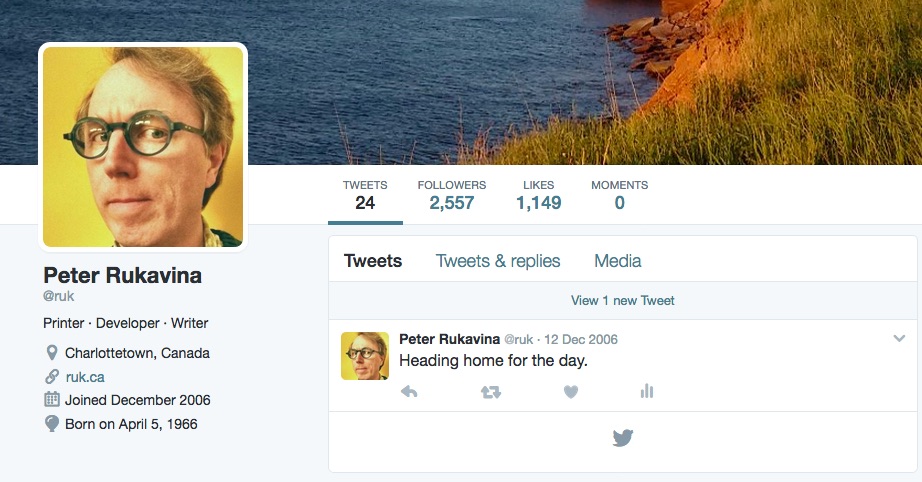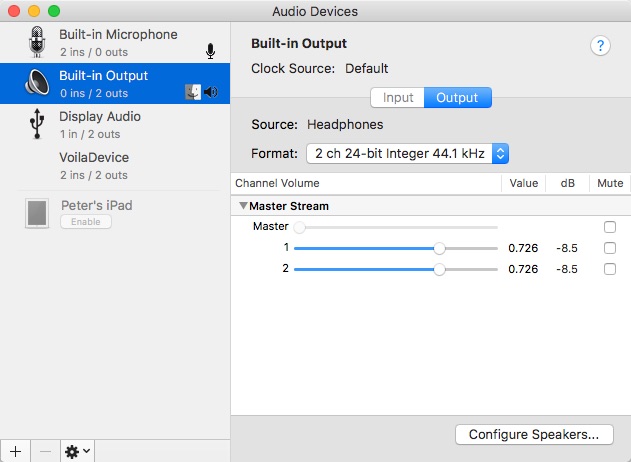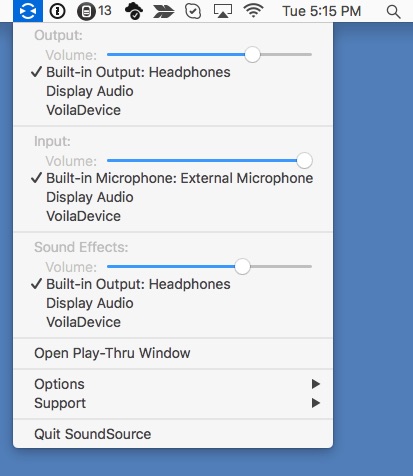A heartfelt tip of the hat to the great Stuart McLean, who died today.
See Hacking Stuart McLean for the step by step.
Remember how I deleted my Twitter archive last month, and how some bits and bobs got left over in the process?
Well William Denton followed my archive-deleting lead, and took another approach, using a versatile Ruby script called t.
I decided to see whether that approach might work for me.
After installing it on my Mac, and following the helpful instructions for getting the script authorized with Twitter, I dumped my timeline:
# t timeline ruk --csv
ID,Posted at,Screen name,Text
319800553192443906,2013-04-04 13:16:08 +0000,ruk,RT @David: Great to see @audible_com join @SoundCloud to promote notable audiobooks https://t.co/bQvEtwK59U
301710262195593216,2013-02-13 15:11:46 +0000,ruk,"RT @David: Welcome to SoundCloud, @thisamerlife https://t.co/4VC5CtqP"
281742627559313408,2012-12-20 12:47:31 +0000,ruk,RT @David: Still very proud of @manolo for this achievement: getting The @WhiteHouse and @BarackObama onto SoundCloud http://t.co/z6HzfssG
144025169202122752,2011-12-06 12:07:30 +0000,ruk,RT @David: Nuce! RT @carhartl: O hai. Unstealthing. http://t.co/1GW3j3xg
103009050316390401,2011-08-15 07:44:06 +0000,ruk,RT @David: Great Sunday morning find on @SoundCloud: this Americana group: http://t.co/tV9CCuC
1017653,2006-12-12 19:55:11 +0000,ruk,Heading home for the day.
And then tried deleting one of those retweets:
# delete status 319800553192443906
Are you sure you want to permanently delete @ruk's status: "RT @David: Great to see @audible_com join @SoundCloud to promote notable audiobooks https://t.co/bQvEtwK59U"? [y/N] y
@ruk deleted the Tweet: "RT @David: Great to see @audible_com join @SoundCloud to promote notable audiobooks https://t.co/bQvEtwK59U"
Sure enough it worked! I repeated for all the others, excepting ye olde first tweet. Which is all that’s left now:
# t timeline ruk --csv
ID,Posted at,Screen name,Text
1017653,2006-12-12 19:55:11 +0000,ruk,Heading home for the day.
What I could not accomplish using Twitter’s website, I was able to do through this side door. And so all you’ll find on my profile page is that single original “hello world”:

Twitter’s counters are still off–I don’t have 24 tweets in my timeline, I have one, and I deleted all my “likes”–but at least my timeline is barren.
While I’m generally not the kind of person to place much stock in popular psychologists and their behaviour or intervention models, I’ve become quite enamoured of late by the work of Dr. Ross Greene and his Collaborative & Proactive Solutions approach to parenting.
Greene is the author of The Explosive Child, and in that book he describes his approach and the philosophy underpinning it; this paragraph from the second chapter gets to the heart of the matter:
You also may have noticed that your child’s psychiatric diagnosis hasn’t provided much information about the skills he’s lacking or the specific conditions in which those lagging skills are making life difficult. Diagnoses —such as ADHD, oppositional defiant disorder, bipolar disorder, depression, an autism spectrum disorder, reactive attachment disorder, the newly coined disruptive mood regulation disorder, or any other disorder— can be helpful in some ways. They “validate” that there’s something different about your kid, for example. But they can also be counterproductive in that they can cause caregivers to focus more on a child’s challenging behaviors rather than on the lagging skills and unsolved problems giving rise to those behaviors. Also, diagnoses suggest that the problem resides within the child and that it’s the child who needs to be fixed. The reality is that it takes two to tango. Let there be no doubt, there’s something different about your child. But you are part of the mix as well. How you understand and respond to the hand you’ve been dealt is essential to helping your child.
What attracts me to Greene’s approach is that it roughly parallels the path that Oliver and I have been on in recent months: collaboration rather than conflict, understanding rather than tyranny. Oliver’s been an important teacher to me in all of this, and I think I’ve been able to help Oliver too. That Greene focuses on practical challenges and not diagnoses, and that he focuses not on behaviour but rather on skills, is refreshing in a contemporary parenting climate that remains firm in its belief that kids with behavioural challenges are, as Greene describes it, guilty of being “willful, manipulative, attention-seeking, limit-testing, contrary, intransigent, [and] unmotivated.”
This 2010 piece on TVO, featuring Greene and Toronto psychologist Jordan B. Peterson, is an excellent demonstration of the difference between Greene’s approach and the one many parents get exposed to clinically. For a parent, Peterson’s language and characterizations of behaviour are next to useless; Greene speaks in plain, practical language and focuses on the real world, not an academic psychological conception thereof.
I learned by happenstance that the Miꞌkmaq Confederacy of Prince Edward Island is bringing Dr. Greene to Summerside for a workshop on April 28, 2017. The registration form is available online, and more information is available from Taylor Jenkins at the Miꞌkmaq Confederacy.
The tuition of $150 will be steep for many; but if my experience to date is any guide, the benefits of adopting Dr. Greene’s model can be profound, making it worth every dollar.
After years of being on the other side of the Freedom of Information and Protection of Privacy desk, I received a a note today from Public Schools Branch’s FOIPP coordinator that they’d received a request for records that included two emails from me, in my capacity as President of PEI Home and School Federation regarding request from the then-English Language School Board for feedback on plan for 2015 PISA tests.
Ironically, the document at the heart of the request was posted for the general public on the PEIHSF website at the same time, and his been publicly available since.
I quickly indicated that I had no issue with the release of the document and associated emails.
It’s nice to be able to do my own small part to make information flow to requesters quickly and without hassle.
From The Creative Independent, TM Davy on being a painter
The art world is so slow. Painting is so slow. The idea the you’re going to go to a few openings and just take power somehow is ridiculous. It’s pretty easy to fall into these traps of feeling like nobody really gets you and that can throw off your whole relationship to everybody around you and to your work. I think I’m always on guard about that a bit. I’m pretty good about keeping things in the right perspective regarding my own life, but I’ve seen this happen to people I know. I have sometimes tried to reach out to people when it seems like they are being swept up in that feeling. When you get fixated on the idea that, “Oh, New York is not a community,” things can get out of control really easily. It’s easy to fall into circles of negativity. The trick is just finding the right circle, finding people that make you feel supported and inspired. I was thinking about that at my most recent opening. I was looking around the room and realizing that it was a room full of mostly artists, which felt good. I felt lucky.
I’ve long been convinced that entrepreneurship is, at its core, a learning disability: to float a novel business concept long enough for it to take on a life of its own requires uncommon inability to listen to and integrate the opinions of others.
The alternative, Davy points out, is “finding the right circle.” A supportive network that will help you nurture your novelty.
At its best this allows great new things to flourish. At its worst it creates the necessary preconditions for dictatorship.
From Alexa, stop! 3 ways to make Amazon’s voice assistant kid-proof:
Some parenting experts are warning that overusing the device could make some children feel that Alexa is a servant to be commanded, which is behavior that could potentially be carried over to the schoolyard.
There are many reasons to fear our digital future; this is not one of them. Some parenting experts are idiots.
Monday and Tuesday brought a lot of snow to 100 Prince Street. And our new snow plowing contractor, from Kinkora, proved their worth by doing a thorough clean-out (with a follow-up after I managed to extricate the car).

Who among us has not spent time on the telephone with a friend or family member experiencing audio issues with their Mac.
The sound isn’t coming out of the headphones. Or it is coming out of the headphones and they don’t want it to. Or they can hear a Skype call, but the person on the other end can’t hear them.
Most of the solutions to problems like this on a Mac require the mysteriously-named application called Audio MIDI Setup, something that should have been replaced (and renamed) by Apple years ago. It’s got a cryptic user interface and all sorts of controls that are of practical utility to almost nobody.

Enter the new app SoundSource from Rogue Amoeba, with utility that should have been baked right into macOS from the beginning.
Now what you used to need Audio MIDI Setup for, you can now do right from your menu bar:

SoundSource is only $10, and if you’ve got another licensed Rogue Amoeba product–and you should probably own at least Audio Hijack–you can get a SoundSource license for free (I was so impressed by that offer that I paid $25 to update my Audio Hijack to the latest version just so I could do that; it’s a great idea).


 I am
I am